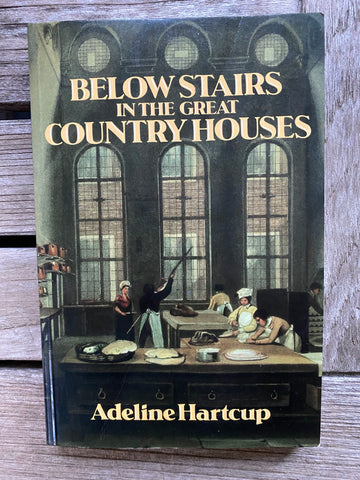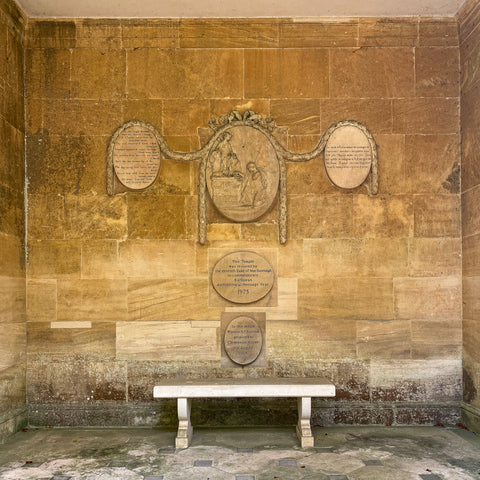
Below Stairs - Lessons for Today
Having visited the magnificent Blenheim Palace at the weekend, I decided to look out a book I had on the running of the great country houses during the 18th and 19th century with a particular focus on the servants within these houses.

Visiting any of our great houses - never mind Blenheim Palace - one is struck by the enormity of the task of looking after such places and their occupants and the skills required to meet the high standards demanded of the those who lived in them.
Re-reading Below Stairs in the Great Country Houses by Adeline Hartcup (published in 1980) gives a fascinating glimpse of a world long gone but is nevertheless instructive in so many ways for today.

One is immediately struck by two things: the back breaking work of many of the tasks and the very high degree of organisation and separation of skills. Stratification of positions and status was as important below stairs as it was amongst those the servants waited upon above stairs.

Not only were men’s roles separated from women’s roles, the supervision and organisation of the male and female staff was also separated between the House Steward for the men and the Housekeeper for the women. The House Steward and Housekeeper were responsible for appointing the necessary servants for each of the roles under their supervision with the exception of the master’s valet and mistress’s lady’s maid which were appointed directly by the master and mistress.
The servants were then divided into the Upper Ten and Lower five which further denoted the status of the individual servant. Thus the House Steward, Housekeeper, Groom of the Chambers, Butler, Valet, Lady’s Maid and Cook were considered to be part of the Upper Ten, whilst the Footmen, Under-Butler, Young Ladies Maids, Housemaid, Scullery Maid, Kitchen Maid and Laundry Maid formed the Lower Five. (The numbers ten and five do not necessary signify an exact number in each category.) Some in the Lower Five would hope in time to advance to join the Upper Ten whilst many would remain forever a part of the lower ranks.

Each servant had distinct jobs allotted to them and was expected to work in a co-ordinated manner with the other servants. They were expected to be precise, punctual and exemplary in every aspect. Failure could cost them their position and, in the days before the welfare state, to lose one’s position without a reference could be disastrous.
Reading about this made me wonder if there were lessons we could draw from the past that might be useful in the efficient running of our homes today.
Fortunately we now have a great many appliances that have removed much of the back breaking work of the 18th and 19th century. We no longer need to carry buckets of water upstairs to fill hip baths nor clean and relight fires in a multitude of rooms. Appliances, smaller houses, central heating and hot and cold running water are now taken for granted.
Nevertheless, there is much that still needs to be done to run an efficient house. Laundry, cleaning, cooking, and maintenance of both the fabric of the house and its equipment dominate the tasks in today’s world. Add to that gardening and the workload is considerable. Those that do not have the time or inclination to carry out the work of running a house can contract it out and it is perfectly possible to enjoy an 19th century lifestyle of leisure without having to lift a finger. Gardening, washing and ironing, cooking, cleaning and handyman jobs can all be undertaken by others - at a cost. Exactly how many live in such style outside of the wealthiest of metropolitan areas I can not say, however, in the countryside help within a home is, for the most part, centred around cleaning and gardening.
If you do not wish to have more than occasional help in your home the secret of efficiency is organisation and routine. Planning of daily, weekly or seasonal tasks is essential in an orderly house and in maintaining the fabric of the building, furnishings and appliances. Whilst we may not have to light fires in every room every day the list of tasks beyond the ordinary day to day chores is considerable. Consider but a few - turning mattresses over for even wear, cleaning Venetian or roller blinds, dusting bookshelves, washing doors and skirting boards, sorting out the wardrobes and checking clothes for mending or discarding. The list is almost endless and for sure many do not bother much beyond a quick dust and vacuum of the rooms. To be fastidious is a matter of personal choice but I prefer to strive for a level beyond what many might put up with. (I fall far short of any kind of perfection but I get a satisfaction in the effort for orderliness and structure within the house.)
The two greatest impediments to a well run house in this day and age are lack of organisation and clutter. These are the enemy of efficiency but when combined are a formidable foe. So, here are my two recommendations -
1 - Start by planning what needs doing in outline - the detail will follow - and when and by who it should be done. Create a list of all your regular suppliers and their contact details and ensure that it is available when required. Bear in mind the importance of seasonal jobs such as clearing gutters and servicing boilers.
2 - Examine every room, every shelf, every cupboard and discard anything that you neither use or do not find beautiful. This is a hard task but freeing yourself of clutter frees the mind and organisation (and cleaning) becomes easier as a result.
In summary, we can no longer live like the aristocrats of the past. Not even the aristocrats of today can live like that any longer. For most we either have to contract out what we can or organise to do the work ourselves. But by thinking through the tasks and planning ahead we can attempt to live in an orderly house and maintain a semblance of work life balance.







